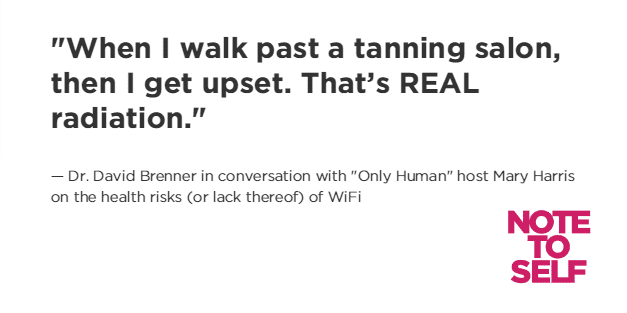WiFi, Cancer, and Paranoia
WiFi, Cancer, and Paranoia
This is the latest installment of “Question of Note,” in which we take a listener’s question — your question! — and find just the right the person to answer it. See them all here as we go along.
Got a Question of Note you’d like answered? Email notetoself@wnyc.org with a voice memo. Here’s how to record one.
Between our cell phones, wireless Internet networks, and all of the set-ups that let our devices communicate with one another wirelessly, we’re pretty much constantly bathing in low-level radiation.
This worries Martha, a listener in Santa Fe, whose mother asked her for a set of wireless headphones:
“I’ve been listening to your podcast for a few months and am glad to hear so many other people are concerned with the tech issues that bother me too. Right now I’m concerned about wireless (RF) and bluetooth radiation. Wireless devices have so quickly become a part of our lives, but it is looking more and more likely that they could also have potentially serious health effects.
My mom has trouble hearing, and wants me to get her a set of wireless headphones to watch TV without blasting the whole house. That sounds good, but the more research I do, the less I am happy about her having wireless (or wired) headphones next to her skull for hours each day. She just sees the convenience, and writes off the list of potential side effects (brain tumors, cancer, cataracts, headaches, skin problems, etc). I’d love to hear your take on this issue.”
To delve deeper into the question, we spoke with Mary Harris, host of WNYC’s new health podcast “Only Human.”
Mary says the fact of the matter is that scientists haven’t yet found any conclusive evidence that suggests WiFi is dangerous. The waves involved in letting you use your cell phone, browse the web, or listen to the radio are much, much lower energy than X-rays or gamma rays — the kind that can actually break down DNA strands and cause mutations, which is why you have to protect yourself with a lead blanket when the dentist takes images of your teeth. Scientists have yet to prove that WiFi could lead to cancer.
When it comes to cell phones, there’s some evidence that suggests a link between cell phone usage and a slightly elevated rate of cancer — but because these weren’t experimental studies, there’s no way of knowing whether cell phones are the culprit, or whether that rate has gone up because diagnostic techniques have improved. Mary spoke about this with David Brenner, a professor of radiation biophysics at Columbia, who pointed out that there are much bigger things to be worried about when it comes to cancer-causing radiation:
 Yup.
(Mary Harris/Only Human)
Yup.
(Mary Harris/Only Human)
Even the most diligent consumer would have a hard — if not impossible — time avoiding every potential cancer-causing agent.
“If you tried to eliminate every possible carcinogen, you wouldn’t eat, wouldn’t breathe, wouldn’t go out in the sunshine — we have to be pragmatic about how to interpret these things,” Brenner says.
However, cancer isn’t the only concern with WiFi. In recent years, a number of people have reported suffering from what’s known as electromagnetic hypersensitivity, with symptoms like nausea, dizziness, and heart palpitations. In Massachusetts, a family is suing their son’s boarding school for causing him to experience this syndrome after the school boosted its WiFi signal in 2013; meanwhile, in France, a court recently ruled that a woman suffering from symptoms of electromagnetic hypersensitivity could receive disability payments — and this comes on the heels of France banning WiFi in its nursery schools. Still, the science is hazy here, as well: though these people’s symptoms are real, there’s no proof that electromagnetic fields like WiFi are the cause.
One thing we do know for sure, thanks to David Brenner: Those wireless headphones Martha’s mom wants? They’re perfectly safe. They don’t actually emit a wireless signal; they just receive it — so wearing them on her head for hours each day won’t expose her to much at all.
As for the rest of us, we can rest assured that our WiFi probably isn’t giving us cancer, and we’d be better served by sticking to the basics: remembering to wear some SPF, laying off the cigarettes, and getting our heart rates up once and a while. But if it makes you feel better to use headphones with your cell phone or keep the WiFi away from your baby’s room, go for it — you certainly won’t be hurting anyone.
UPDATE: A lot of listeners were curious about the source of our statistic on the risk of developing cancer. That stat comes from the National Cancer Institute, which tells us that “approximately 39.6 percent of men and women will be diagnosed with all cancer sites at some point during their lifetime, based on 2010-2012 data.”
Hear the first episode of Only Human here. It will make you cry. In a meaningful way.
And as always, subscribe to Note to Self on iTunes, Stitcher, TuneIn, I Heart Radio, or anywhere else using our RSS feed.